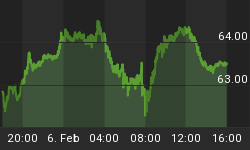While all the talk at present is about economic corners turned and markets charging ahead, no one is paying much notice to an American economy deteriorating before our eyes. These myopic commentators seem to be simply moving past the now almost-universally held conclusion that before the crash of 2008, our economy was on an unsustainable course. If these imbalances had been corrected, then perhaps I too would be joining in the euphoria. But evidence abounds that we have not veered at all from that dangerous path.
Last week, the Bureau of Economic Analysis reported that consumer spending as a percentage of U.S. GDP has risen to 71%, a post-World War II record. This level is notably higher than other wealthy industrialized countries, and vastly higher than the levels sustained by China and other emerging economies. At the same time, our industrial output is contracting, our trade deficit is expanding once again (after contracting earlier in the year), and our savings rate is plummeting (after an early year surge).
The data confirms that government stimuli are worsening the structural imbalances underlying our economy. The recent 'rebound' in GDP is not resulting from increased economic output, but merely from the fact that we are borrowing more than ever. That is precisely how we got ourselves into this mess. An economy cannot grow indefinitely by borrowing more than it produces. Not only is such a course untenable, but the added debt ensures a deeper recession when the bills come due.
This soon-to-be-called depression will not end until the pendulum of consumer spending habits swings violently in the other direction. This will be a jarring change, but it is the splash of cold water that we need to return our economy to viability. I believe that consumer spending as a share of GDP will need to temporarily contract to roughly 50% of GDP, before eventually moving toward its historic mean of 65%. Such a move would indicate a restoration of our personal savings, a decline in borrowing and trade deficits, and an increased industrial output. That would be a real recovery.
In the meantime, the higher the spending percentage climbs, the more painful the ultimate decline becomes.
Consumers and governments must spend less so their savings can be made available to businesses for capital investments. Businesses, in turn, will produce more products and employ more people - increasing domestic prosperity. However, rather than allowing a painful cure to return our economy to health, the government prefers to numb the voting public with a toxic saline-drip of deficit spending and cheap money.
The primary factor that enables our government to peddle economic snake oil is the dollar's unique role as the world's reserve currency, and our creditors' willingness to preserve its status. By buying up dollars and loaning them back to us through Treasury debt, productive countries give American politicians carte blanche to play Santa Claus.
Ironically, as foreign governments finance our spending spree, they are simultaneously scolding us for our low savings rate. At the recent G20 meeting in Pittsburgh, all agreed - including President Obama - that resolving the global economic imbalances was a top priority. By definition, this would require Americans to spend less and save more. However, with foreign central banks continuing to buy our debt, the President has shown no political will to encourage this change.
Normally, if politicians run up the government deficit, voters soon suffer the unpleasant consequences of higher inflation and rising interest rates. Yet, if foreign central banks keep supplying the funds, these consequences are indefinitely postponed. As a result, there is no need for American politicians to ever make the tough choices required to solve our problems.
Instead, the burden may fall squarely on the citizens of those governments doing all the lending. The conflict is that within the creditor states, a vocal minority actually benefits from this subsidy (owners of Chinese exporters, for example) while the overwhelming majority fails to make the connection. Thus, foreign politicians have the same incentives as ours to keep playing the game.
The bottom line is that foreign governments can lecture us all they want about the need for prudence but if they keep lending, we'll keep spending. Any parent knows that if you give your child a curfew yet never impose any penalties when it's violated, it will not be respected. My gut feeling is that foreign governments are tiring of our conduct and on the verge of finally imposing some discipline. That means the dollar's days as the world's reserve currency are numbered, and the days of American austerity are about to begin.
For a more in-depth analysis of our financial problems and the inherent dangers they pose for the U.S. economy and U.S. dollar, read Peter Schiff's 2008 bestseller "The Little Book of Bull Moves in Bear Markets" and his newest release "Crash Proof 2.0: How to Profit from the Economic Collapse." Click here to learn more.
More importantly, don't let the great deals pass you by. Get an inside view of Peter's playbook with his new Special Report, "Peter Schiff's Five Favorite Investment Choices for the Next Five Years." Click here to dowload the report for free. You can find more free services for global investors, and learn about the Euro Pacific advantage, at www.europac.net.















